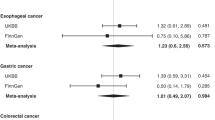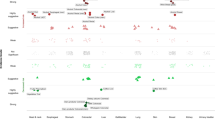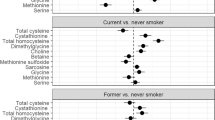Abstract
Background/Objectives:
B vitamins and related enzymes involved in one-carbon metabolism are necessary for DNA replication, DNA repair and regulation of gene expression. Disruption of one-carbon mechanism may affect cancer risk. We investigated prospectively the relationship between dietary intakes of methionine, B vitamins associated with one-carbon metabolism and risk of lung cancer.
Subjects/Methods:
The Melbourne Collaborative Cohort Study recruited 41 514 men and women aged 40–69 years between 1990 and 1994. During follow-up of 14 595 men and 22 451 women for an average of 15 years, we ascertained 348 incident lung cancers. Dietary intake of B vitamins and methionine was estimated from a 121-item food frequency questionnaire. Hazard ratios (HR) and 95% confidence intervals (CI) were estimated using Cox regression.
Results:
In current smokers, dietary intake of riboflavin was inversely associated with lung cancer risk (HR=0.53; 95% CI: 0.29–0.94, fifth versus first quintile; P-linear trend=0.01). No associations were found for former or never smokers or for dietary intake of any of the other B vitamins or methionine.
Conclusion:
Overall, we found little evidence of an association between B vitamins or methionine and lung cancer risk. The weak inverse association between riboflavin and lung cancer risk in current smokers needs further investigation.
This is a preview of subscription content, access via your institution
Access options
Subscribe to this journal
Receive 12 print issues and online access
$259.00 per year
only $21.58 per issue
Buy this article
- Purchase on Springer Link
- Instant access to full article PDF
Prices may be subject to local taxes which are calculated during checkout
Similar content being viewed by others
References
Aune D, Deneo-Pellegrini H, Ronco AL, Boffetta P, Acosta G, Mendilaharsu M et al. (2011). Dietary folate intake and the risk of 11 types of cancer: a case-control study in Uruguay. Ann Oncol 22, 444–451.
Bandera EV, Freudenheim JL, Marshall JR, Zielezny M, Priore RL, Brasure J et al. (1997). Diet and alcohol consumption and lung cancer risk in the New York State Cohort (United States). Cancer Causes Control 8, 828–840.
Bates CJ, Fuller NJ (1986). The effect of riboflavin deficiency on methylenetetrahydrofolate reductase (NADPH) (EC 1.5.1.20) and folate metabolism in the rat. Br J Nutr 55, 455–464.
Cho E, Hunter DJ, Spiegelman D, Albanes D, Beeson WL, van den Brandt PA et al. (2006). Intakes of vitamins A, C and E and folate and multivitamins and lung cancer: a pooled analysis of 8 prospective studies. Int J Cancer 118, 970–978.
FSANZ Food Standards Australian New Zealand 1.3.2. http://www.foodstandards.gov.au/_srcfiles/Standard_1_3_2_Vits_&_Mins_v113.pdf (accessed December 2010).
FSANZ (2006) Food Standards Australia New Zealand. NUTTAB 2006. http://www.foodstandards.gov.au/consumerinformation/nuttab2006/onlineversionintroduction/onlineversion.cfm (accessed July 2010).
FSANZ (2009) Food Standards Australian New Zealand 2.1.1 Clause 4. http://www.foodstandards.gov.au/_srcfiles/Standard_2_1_1_Cereals_v114.pdf (accessed December 2010).
Hartman TJ, Woodson K, Stolzenberg-Solomon R, Virtamo J, Selhub J, Barrett MJ et al. (2001). Association of the B-vitamins pyridoxal 5′-phosphate (B(6)), B(12), and folate with lung cancer risk in older men. Am J Epidemiol 153, 688–694.
Ireland P, Jolley D, Giles G, O'Dea K, Powles J, Rutishauser I et al. (1994). Development of the Melbourne FFQ: a food frequency questionnaire for use in an Australian prospective study involving an ethnically diverse cohort. Asia Pac J Clin Nutr 3, 19–31.
Johansson M, Relton C, Ueland PM, Vollset SE, Midttun O, Nygard O et al (2010). Serum B vitamin levels and risk of lung cancer. JAMA 303, 2377–2385.
Jungjohann SM, Luhrmann PM, Bender R, Blettner M, Neuhauser-Berthold M (2005). Eight-year trends in food, energy and macronutrient intake in a sample of elderly German subjects. Br J Nutr 93, 361–378.
Kabat GC, Miller AB, Jain M, Rohan TE (2008). Dietary intake of selected B vitamins in relation to risk of major cancers in women. Br J Cancer 99, 816–821.
Key T (1994). Micronutrients and cancer aetiology: the epidemiological evidence. Proc Nutr Soc 53, 605–614.
Kim YI (2004). Folate and DNA methylation: a mechanistic link between folate deficiency and colorectal cancer? Cancer Epidemiol Biomarkers Prev 13, 511–519.
Korn EL, Graubard BI, Midthune D (1997). Time-to-event analysis of longitudinal follow-up of a survey: choice of the time-scale. Am J Epidemiol 145, 72–80.
Lohman TG, Roche AF, Martorell R (1988). Anthropometric standardization Reference Manual. Kinetic Books: Champaign, IL.
Powers HJ (2003). Riboflavin (vitamin B-2) and health. Am J Clin Nutr 77, 1352–1360.
Powers HJ (2005). Interaction among folate, riboflavin, genotype, and cancer, with reference to colorectal and cervical cancer. J Nutr 135, 2960S–2966S.
Shen H, Wei Q, Pillow PC, Amos CI, Hong WK, Spitz MR (2003). Dietary folate intake and lung cancer risk in former smokers: a case-control analysis. Cancer Epidemiol Biomarkers Prev 12, 980–986.
Voorrips LE, Goldbohm RA, Brants HA, van Poppel GA, Sturmans F, Hermus RJ et al. (2000). A prospective cohort study on antioxidant and folate intake and male lung cancer risk. Cancer Epidemiol Biomarkers Prev 9, 357–365.
Willett W, Stampfer MJ (1986). Total energy intake: implications for epidemiologic analyses. Am J Epidemiol 124, 17–27.
Yuan JM, Stram DO, Arakawa K, Lee HP, Yu MC (2003). Dietary cryptoxanthin and reduced risk of lung cancer: the Singapore Chinese Health Study. Cancer Epidemiol Biomarkers Prev 12, 890–898.
Acknowledgements
This study was made possible by the contribution of many people, including the original investigators and the diligent team who recruited the participants and who continue working on follow-up. We would also like to express our gratitude to the many thousands of Melbourne residents who continue to participate in the study. Cohort recruitment was funded by VicHealth and The Cancer Council Victoria. This work was supported by infrastructure from the Cancer Council Victoria and grants from the NHMRC (209057, 251533 and 520316).
Author information
Authors and Affiliations
Corresponding author
Ethics declarations
Competing interests
The authors declare no conflict of interest.
Rights and permissions
About this article
Cite this article
Bassett, J., Hodge, A., English, D. et al. Dietary intake of B vitamins and methionine and risk of lung cancer. Eur J Clin Nutr 66, 182–187 (2012). https://doi.org/10.1038/ejcn.2011.157
Received:
Revised:
Accepted:
Published:
Issue Date:
DOI: https://doi.org/10.1038/ejcn.2011.157



